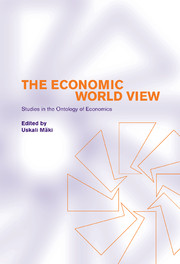Book contents
- Frontmatter
- Contents
- Notes on the contributors
- Preface
- I The what, why, and how of economic ontology
- 1 Economic ontology: what? why? how?
- 2 The empirical presuppositions of metaphysical explanations in economics
- 3 Quality and quantity in economics: the metaphysical construction of the economic realm
- II Rationality and homo economicus
- Part III Micro, macro, and markets
- Part IV The world of economic causes
- Part V Methodological implications of economic ontology
- Name index
- Subject index
3 - Quality and quantity in economics: the metaphysical construction of the economic realm
Published online by Cambridge University Press: 04 August 2010
- Frontmatter
- Contents
- Notes on the contributors
- Preface
- I The what, why, and how of economic ontology
- 1 Economic ontology: what? why? how?
- 2 The empirical presuppositions of metaphysical explanations in economics
- 3 Quality and quantity in economics: the metaphysical construction of the economic realm
- II Rationality and homo economicus
- Part III Micro, macro, and markets
- Part IV The world of economic causes
- Part V Methodological implications of economic ontology
- Name index
- Subject index
Summary
There is a feeling today, more or less vague but nonetheless real, that accountants, economists, and others who deal mainly with money, inhabit a different world from everyone else. This ‘economic world' maps roughly onto the ordinary world of things, people, and the activities of life, but it comes subtly adrift at important points in ways that produce bafflement. Economists often insist that they live in the ‘real world', with the heavy implication that their critics and detractors live in a world of dreams, and though this insistence is sometimes enough to silence opposition, it is seldom accepted as wholly convincing or satisfactory.
My purpose here is to argue that this feeling that the economic world is strange has substantial grounding of a kind not to be be brushed aside as inexpert ‘folk economics'. The feeling presupposes a contrast between a commonsense world and an economic world, and if there is such a contrast to be drawn, it ought to be possible to say something about these worlds and how and why they differ. I shall take it that the commonsense world is the world as it is ordinarily thought of and spoken about, and by ‘ordinary' thought and speech I mean those conducted in terms of the concepts of the natural language we all use. The economic world, accordingly, is the world as it is thought of and spoken about using economic concepts.
In order to limit and define the task I shall consider two ordinary concepts which have fundamental places in our common conceptual scheme for dealing with the world and its contents, that of a thing and that of an activity.
- Type
- Chapter
- Information
- The Economic World ViewStudies in the Ontology of Economics, pp. 32 - 54Publisher: Cambridge University PressPrint publication year: 2001
- 4
- Cited by



